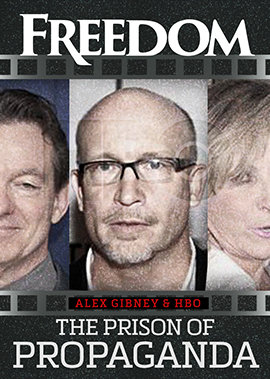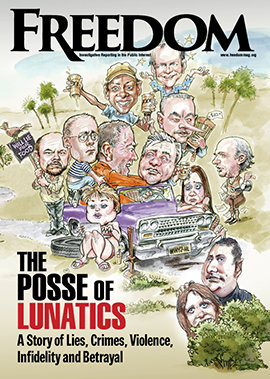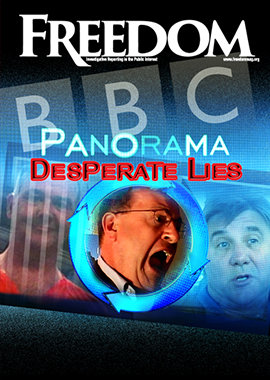She had been prescribed psychiatric drugs, which promptly resulted in an overpowering wish to do away with herself, and her daughter became an unwilling eyewitness to many such attempts. The little girl, Klára Hídvégi, vowed one day to serve as a voice for those like her mother who couldn’t speak for themselves.
Meanwhile, a young boy in Budapest watched helplessly as yet another bully beat up yet another small child. Witnessing the injustice, he wished he could stand up for the child—to help him somehow. It’s why János Dobos, as a little boy, resolved to one day fight for the rights of others.
János Dobos and Klára Hídvégi, whose story is chronicled in Voices for Humanity on Scientology Network, found their life’s work through the Citizens Commission on Human Rights (CCHR), a mental health watchdog that exposes psychiatric abuse and human rights violations. Today, Dobos is CCHR Hungary’s president and Hídvégi its director of operations.
Then the phones began to ring, and the horror stories came flooding in.
Two million people in Hungary receive psychiatric treatment—more than the entire population of Budapest. Of those 2 million, 10 to 15,000 are treated by force, against their will, every year. That equates to 30 to 40 vulnerable human beings a day whose human rights are violated.
“The major problem in this country is the use of involuntary commitment,” Dobos says.

The United Nations, the World Health Organization and even the World Psychiatric Association all agree. “Coercion is harmful to both physical and mental health,” the UN High Commissioner for Human Rights wrote in 2023. “When violence, coercion and abuse occur in mental health services, the service not only fails to help people, but also exacerbates the original difficulties.”
He was putting it mildly. Once you’ve revoked a person’s freedom, his life is no longer his own. He can be violated, abused, shackled, drugged, beaten and electroshocked.
Hídvégi describes how psychiatric abuse victims “are deprived of their personal freedom, though they didn’t commit any crime at all. They are so sedated or medicated they don’t even know what is happening to them.”
Dobos and Hídvégi began raising awareness of these atrocities, distributing flyers that read: “If you or your family have been abused by a psychiatrist, please contact us.”
Then the phones began to ring, and the horror stories came flooding in.
“One early morning a phone call came in that many psychiatrists had been using caged beds,” Hídvégi said. “It’s a hospital bed that is a metal cage which is covered by a net.”
After being locked in that cage for days, one patient hung himself. Another was raped while two nurses held him by the legs.

These case histories were taken directly to the Ministry of Health, and the stories of psychiatric abuse victims were carried on airwaves to a shocked nation.
Thanks to Dobos and Hídvégi’s efforts, caged beds are now banned in Hungary.
Abuse case after abuse case surfaced, and the investigations into each continued: involuntary commitments, patients drugged, bones broken and victims rendered almost unconscious. And as the psychiatric atrocities came to light, so did the backlash from those who profited by keeping the atrocities in the shadows.
Until CCHR came on the scene, psychiatrists in Hungary evidently did whatever they pleased. Now threatened, the psychiatric industry lashed out with a torrent of articles, TV shows and other media, all condemning Dobos, Hídvégi and CCHR.
The bloody footprints led to András Veér, director of the National Institute of Psychiatry and Neurology and a major human rights abuser. Under his watch, the institute executed more involuntary commitments than any other psychiatric facility in Hungary.
But once his abuses were documented and sent to decision-makers, Veér was dismissed, and the National Institute of Psychiatry and Neurology was shut down after nearly a century and a half of operation. Hungary’s largest building is Parliament, and the second largest—eerily enough—had been the National Institute’s.
So it was, as each victim’s abuse was brought to light, each abuser, one by one, was now being brought to justice. At nearly 200 and counting, a parade of offenders have now faced the consequences for what, in wartime, would be called crimes against humanity. One psychiatrist’s abuses were so egregious a judge declared, “That such a crime was committed by this [psychiatrist] was beyond belief.”
Dobos and Hídvégi soon realized that, to truly bring about a society free of psychiatric abuse, they had to enlighten and empower communities to advocate for their own human rights—inspiring the pair to take their campaign to the streets through demonstrations and marches.
Now, at every annual psychiatric conference, CCHR is there—several hundred strong—announcing that psychiatric abuse will not be tolerated. A multimedia exhibition, exposing the full extent of the industry’s abuses of human rights, now travels throughout the country, to the tune of 28 exhibitions in 11 cities to date, all while CCHR documentaries run on local and national television stations.
Thanks to Dobos and Hídvégi, 8.9 million Hungarians have now been reached with facts from CCHR, and its calls for dignity and human rights. Mayors, members of parliament and survivors of psychiatric abuse and their families all testify to the importance of Dobos and Hídvégi’s work.
“We are doing something to protect the fundamental rights of the people of Hungary,” says Dobos. “That is something to be proud of.”






















